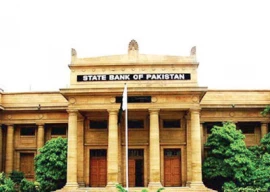
Overall, overseas Pakistani workers remitted $11.383 billion in the first seven months (July to January) of fiscal year 2018, up 3.55% compared with $10.993 billion received during the same period of the preceding year.
Pew Research Center report: The flow of remittances in and out of Pakistan
Remittances play a major role in stabilising Pakistan’s external sector, as they make up almost half the import bill and cover the deficit in the trade of goods account. Nevertheless, in recent times, they have come under pressure due to a global economic slowdown on the back of low crude oil prices.
Perturbed by the widening current account deficit, the government finally allowed the rupee to lose over 5% against the dollar in the second week of December 2017.
The development is positive for overseas Pakistanis as their families are going to get more rupees against the same amount of foreign currency they remit every month. This may also increase the flow of remittances in the coming months as it encourages overseas workers to remit more.
Country-wise breakdown
In January 2018, Pakistan received $235 million in remittances from the UK, which is 30% higher than $181 million that the country received in the same month of the previous year. In the first seven months (Jul-Jan) of fiscal year 2017-18, remittances coming from the UK jumped by 24% to $1.585 billion from $1.278 billion in the same period of last year.
The value of the UK pound has gained at least 8% against the rupee in the last few months. This is the highest jump shown by any major foreign currency against the rupee in the open market.
Analysts believe, apart from other factors, that the increase in the value of any particular foreign currency encourages overseas Pakistanis to send back more money.
Similarly, an increase was also noted in remittances coming from the US as the country received $224 million in January 2018, up 28% compared with $175 million in the same month last year.
Overall, remittances from the US in the first seven months of current fiscal year increased by 11% to $1.50 billion from $1.347 billion. Pakistan received $352 million from the UAE, up 9% compared with $323 million from the same month of the last year.
Rising oil prices herald end of honeymoon for Pakistan’s economy
Remittances from the GCC countries (other than the UAE and Saudi Arabia) stood unchanged at $186 million in January 2018 compared with the same month in 2017.
Remittances received from Norway, Switzerland, Australia, Canada, Japan and other countries (combined) during January 2018 also increased to $154 million in January 2018, up 29.4% compared with $119 million received in January 2017.
Overseas Pakistanis living in the European Union (EU) sent back $56 million in January 2018, up 75% compared with $32 million in the same month of last year.
Saudi Arabia left behind
Remittances from Saudi Arabia - the most important source of remittances for Pakistan - are showing declining trends in recent months.
Remittances from Gulf countries, which have historically accounted for the largest share annually, dropped drastically due to a sharp fall in crude oil prices that hurt the region’s economies.
Pakistan received remittances of $384 million from Saudi Arabia in January 2018, down 11.5% compared with $434 million in the same month of 2017.
Published in The Express Tribune, February 13th, 2018.
Like Business on Facebook, follow @TribuneBiz on Twitter to stay informed and join in the conversation.


1734780406-0/Untitled-(11)1734780406-0-165x106.webp)
1734778885-0/Untitled-(10)1734778885-0-165x106.webp)
1734776708-0/Untitled-(8)1734776708-0-165x106.webp)










1734587529-0/Express-Tribune-(1)1734587529-0-270x192.webp)







COMMENTS (2)
Comments are moderated and generally will be posted if they are on-topic and not abusive.
For more information, please see our Comments FAQ